Let’s cut the crap—“culture” isn’t a ping-pong table in the breakroom or a laminated mission statement on the wall. Culture is Jerry. And Jerry is why people quit.
In this episode of Advertising in America, the boys throw elbows at the myth that culture is fluff. They unpack how toxic bosses, hollow perks, and lip-service values quietly bleed companies dry—and why the few brands that actually live their culture end up building empires. From Wells Fargo’s spectacular crash to Zappos’ billion-dollar sale, the lesson is simple: culture sells, or it sinks.
Episode Highlights
- People don't quit companies—they quit bosses.
- Wells Fargo proves toxic culture costs billions.
- Zappos proves authentic culture can be priceless.
- Pizza parties, perks, and penguins won’t save you.
This episode’s for the leaders brave enough to stop faking it—and bold enough to let their culture be real, messy, and unforgettable.
🎧 Hit play. Then go build a culture that actually means something.
📱 Subscribe wherever you get your podcasts
💬 Are you building a brand people believe in, or just wallpapering over Jerry’s bad behavior with pizza parties?
💥 Brought to you by Wizard of Ads® for Essential Services
Does your culture really matter in how your brand shows up, or is it just a bunch of malarkey?
I've never claimed to be a culture expert, so if an actual culture expert disagrees with me, then please ignore me and trust the expert. People don't quit companies. They quit bosses. No one has ever said, “I hate IBM. I'm sick and tired of IBM. I quit.” No. What they say is, “I'm sick of Jerry. Fuck Jerry, fuck him and all his bullshit. I quit.”
Any of these companies where the consumer has a visible interaction with the staff will benefit by creating a culture where the staff are clearly happy and engaged.
I had a job once back when I was a teenager, where the boss was a complete prick, but the guys who worked for him, we loved each other. We had a common enemy, the boss.
If you run a business that depends on other employees performing well for you to succeed, I encourage you to develop a strong company culture. Does company culture matter to consumers? I don't know.
Ryan Chute: In today's episode of Advertising in America, we're going to debate whether your company culture really matters, starting with the guy who puts the HR in harassment. Here's Mick.
Mick Torbay: I've never claimed to be a culture expert. So if an actual culture expert disagrees with me, then please ignore me and trust the expert. But I have seen a few things in my time, and that's led me to some insights. I had a client in Virginia Beach. He was always complaining about attrition. This town has no loyalty. He said, nobody will stay at a company longer than 18 months. Then they're off to see if the grass is greener somewhere else.
And that got me thinking. I've had a lot of jobs. I've had a lot of bosses, some good, some great, some not so good, but getting a new job is hard. I've stayed at jobs way too long because, although I wasn't happy, at least I understood how it all worked, and you never know if the next one will be worse.
So here's the company owner saying in Virginia Beach, no one will stay at a company longer. 18 months, and I just carefully rephrased that last sentence to, no one will stay at his company longer than 18 months. I'll remind you that Virginia Beach is a military town, with Naval Air Station, as well as being the home base for aircraft carriers and other large ships. There's also an army base and a National Guard station. It's hard to find someone in that town who is not ex-military. We're talking about your most loyal, dependable workforce in the country, and he thinks they can't commit to an air conditioning company. Are you insane?
The owner of this company is a brilliant guy, a genius at working the books, and he could easily tell you what's wrong with your business, but he couldn't see in the mirror.
People don't quit companies. They quit bosses. No one has ever said, “I hate IBM. I'm sick and tired of IBM, I quit.” No. What they say is, “I'm sick of Jerry. Fuck Jerry, fuck him and all his bullshit. I quit.” So if you have a staff retention problem, I'd look long and hard at the person who that quitter directly reported to.
There's your failure in company culture. The problem is Jerry.
I've seen a lot of companies give lip service to culture. They have meetings and company picnics, and team-building exercises. In a lot of cases, they're ticking boxes, and I'm not even sure company culture can be controlled by the boss. I had a job once, back when I was a teenager, where the boss was a complete prick, but the guys who worked for him, we loved each other.
We had a common. The boss, Ron. He's dead now, so I can use his real name. We sang songs about him. Best company culture ever. There was no way we were leaving that job. We worked our asses off, got paid shit, treated like shit, but I still had a blast at work. I still miss those days.
I know Wizard of Ads Partners who truly understand company culture. They've built successful businesses where people are dying to work there, and they've done it multiple times. If you can afford to hire one of those guys, you'll do yourself a world of good. If you can't, just make sure you get rid of Jerry before he costs you your entire staff. Speaking of my former client in Virginia Beach, never in my career have I ever fired a client except him. I'm just saying.
Ryan Chute: Fuck Jerry.
Mick Torbay: Fuck him in the neck.
Ryan Chute: Fuck him. No, seriously fuck you, Jerry.
Now, to defend why culture is a total sham perpetuated by big culture to sell more culture, here's Jerry. I mean Chris.
Chris Torbay: Culture's great for employees; if employees like it there, if they feel appreciated and like they're part of a family, maybe they give a shit more and do better and put in extra effort and cover your ass when you have operational shortcomings, and maybe that helps the business succeed.
Maybe it helps you recruit good people when you're known as a great place to work. So if you run a business that depends on other employees performing well for you to succeed, I encourage you to develop a strong company culture. Does company culture matter to consumers? I don't know. The line is nowhere near as direct.
There are clearly examples of where it does; Starbucks, Southwest Airlines, Disney World, any of these companies where the consumer has a visible interaction with the staff will benefit by creating a culture where the staff are clearly happy and engaged. But there are plenty of successful companies where the company culture is average or maybe below average, and I have no idea.
Does anyone know of a car company with a culture that is significantly different from the rest? Ford, Hyundai, Volkswagen, Dodge? Does anyone know anything about any of their cultures? Does any of that make a difference to the vehicle you buy, or do you buy based on the reputation of the product, independent of any culture?
Does anyone know the culture at Campbell Soup? I assume it's okay, but I don't know. I know I like the soup, though. What about Levi's, or Kellogg's, or Hertz, or Neiman Marcus? Perfectly successful companies with quality products and a premium price, and no particular culture that anyone is aware of unless you work.
To avoid getting sued. I won't accuse anyone specifically, but we all know major running shoe brands have a history of questionable manufacturing conditions that certainly could never be referred to as a strong company culture. Ask the poor kids stitching sneakers together for 12 hours every night, and the punishing Mumbai heat if he's there for the company culture. I suspect the culture sucks, but the kicks are amazing, and hey, if LeBron likes them, I'm buying some.
Miramar Films had a culture of having to sleep with Harvey Weinstein if he wanted to roll in his movies, and they made a ton of great movies in those days.
Anthony Bourdain's Kitchen Confidential told us just how shitty the world's best restaurants treat the staff who literally make the food that makes them successful.
Amazon warehouse workers have to piss in water bottles because they don't get enough breaks, and Amazon is doing just fine, thank you very much. Because rumors of a sketchy culture haven't stopped the average American from wanting to buy cheap consumer goods to fill the existential hole in their heart.
We love it when we see great company culture. If we see that culture reflected in the customer-facing workers we interact with, it's lovely. But can you build a company by grinding your workers down, paying them as little as possible, providing them minimum number of amenities, and basically saying, take it or leave it? Sure can. It means you suck, but you can totally do it.
Ryan Chute: Who wants pineapple Pizza for lunch today? Woo. You've all done such great work. Thank you. We'll be right back after our well-deserved pizza party.
Ryan Chute: Wizard of Ads Partner Ray Seggern, taught us about how the best stories we tell in our advertising are about the employee and buyer experiences that shape why the brand matters. Does a deadbeat culture stunt profitability and growth, or does is it clear out the deadwood?
Mick Torbay: I feel like a bit of a fraud, involving myself in a conversation about company culture. I know just enough about culture to be dangerous. So I feel a little awkward talking about it, but that doesn't change the fact that, we've all been in various situations where we're working and the culture is great and the culture is not. Sadly, I have to agree with Chris to some degree that the company culture and the consumer experience very often have no connection. Which doesn't mean that I don't believe in my heart that a company with a good company culture where everybody loves going to work and sings hi-hoe every morning would not be more successful. I just wish there were an easier way to quantify that.
Chris Torbay: Yeah. I gotta believe, I mentioned, I just picked some names outta the air, Levi's Campbell Soup, all these companies where we don't, the average person doesn't know anything about their culture.
I would assume that they probably do spend some time because the last thing you would want is to find out, “Hey, that soup company that everybody likes, and it's so wholesome and so family-oriented. It turns out they're a bunch of bastards.” So nobody wants that to come out. And so I assume you know that there's a minimum average that keep most people stick to.
Ryan Chute: The minimum viable product strategy of disappointing people just to a certain point. There's always a culture, right? No matter what company you're in, there is a culture because while leadership can set the tone for the culture based off of what they tolerate, the reality of it is it's gonna be good, it's gonna be not good, or it's going to be super toxic, and you have to decide what that means to your business. Now, I talk about this in friction all the time, and it really boils down to communication. People are the wild card, and they represent 80% of our business effort at any given time. So if all we're doing is working hard to put out fires and deal with employees, deal with customers, because we don't have a culture that serves a culture that removes friction. A culture that makes it easy for sellers to sell and easy for buyers to buy, that by its very nature is going to put drag on the flywheel of business, and that reduces profitability. It certainly reduces your highest potential for growth. And that's really what I see.
So a big question is what's the quantifiable examples of that?
I have two quantifiable examples. One is Wells Fargo, and the other is Zappos.
So Wells Fargo, 2016, got busted. Big time, multi-billion dollar scam for what happened during the financial crisis. They had basically set up a culture, a toxic culture of sales effort that took advantage of people at the highest levels. And then they bundled all of this bad business up into otherwise good stock, and that's one of the biggest culprits of the entire financial crisis having led it down the road that we ended up going down in 2009.
Chris Torbay: Which is a culture of just runaway ambition or runaway competitiveness as opposed to we're trying to make a great company here, or we're trying to do great things for people here. It's somehow delineated or descended into make sales at all costs. Sell products at all costs.
Ryan Chute: And that in itself has an inertia, right? Roy says that the masses of people are predictable, but the individual is not. And that falls into that category of you get this herd mentality pushing towards a, if you work here, you're going to be a sales goon. And if you're not a sales goon, then get out. No different than the old movie Boiler Room that we saw with just some fantastic cast, but what a wonderful movie. Anyway, I'll digress.
Mick Torbay: But you look at what affects the success of the company, and it's easy to talk about sales, and I think it's harder to connect those dots of good company culture with sales. I've flown Southwest, had a blast. It seems like everybody there is having a blast. Had a great experience, but I'm not sure I would choose the wrong time to depart or the wrong price to pay to fly Southwest versus something else based solely on having a good time.
Chris Torbay: If there was a tie on all the other things, two flights, two different airlines, but at the same time, same price. I'll take the Southwest one. I know I’ll have a good time, but how much would you shell out extra?
Mick Torbay: But, for example, at the last big agency where you work, I don't think you could describe the company culture there as being particularly good. And yet, I don't know if, I don't think it affected the quality of the work you guys did. I think the work you did was top-notch, even though there might not have been the best company culture there.
What the company culture cost them was their creative director, and that is gonna affect your ability to do business. So I think that's part of it, right? It might be more about that, like more about keeping. Keeping key people in, keeping them in key positions. If somebody who's really good at what they do, who does not enjoy going to work, will find work elsewhere, and will easily find work elsewhere.
And replacing that person is, first of all time consuming. Second of all, expensive. And third of all, it might not work.
Chris Torbay: That’s also where you get things like quiet quitting. Which is, if the culture kind of sucks, then you go in there, you take your paycheck because you know it's a pretty good paycheck.
And as you said before, it's hard to find a new job. But you spend your whole day saying, “Yeah, they're not paying me enough to go and do that, or to cover so-and-so's ass, or to, whatever.” And so they're letting problems go up. “They're gonna let this problem happen. I'm just gonna, yeah. It's not my fault,” whereas if you belong to a company that does have a really strong culture, you go, “Hey, geez, I should go tell somebody that this, we're heading towards this iceberg,” and whatever you feel a bit of ownership and responsibility to save everybody else's asses beause you feel like a family.
Ryan Chute: And I think you just said something that's really important, that they have a sense of ownership. They have a sense of dignity, of contribution to something that's pointing towards the greater good. And when we really distill this down, there are 12 kind of major components that I've identified in the culture that are slowing things down or speeding things up.
But ultimately, it boils down to how much does that matter? And if everything was operating optimally, what is the net result?
For short-term thinkers, like Wells Fargo, who created three and a half million fraudulent accounts between 2002 to 2016, as it grew momentum, ultimately you end up seeing this opportunity unfold, and things fall apart. You flip over to Zappos, and they sold for in excess of a billion dollars because they oriented everything around the customer service that they delivered, that unreasonable hospitality that they delivered every day in and day out. And I think, while we may not see it in some things in the marketing top of funnel, we are seeing it mid funnel as the people start interacting with customer service agents, technicians, and or salespeople, or the speed at which they receive things done well, a whole bunch of this stuff becomes invisible, right?
Things just got done faster, easier, smoother, cleaner, and it was done, and the customer didn't have an impression of wow, but maybe, certainly had an impression of that’s easy enough for me to go back and do that again. And given the two choices between Frontier and Southwest, I'm gonna choose Southwest for the sake of 20 bucks difference in the price because I can rely on the experience.
Mick Torbay: And how important is it as an employee of the company to know that your boss has your back? Breaking in a boss is difficult. Nobody likes to do it. But the boss's job is to serve the subordinates. And I think if the boss has that attitude of it's my job to make your job easier, and you come to me with what will allow you to accomplish more, that's gonna set things up for success. I'm not sure everybody who rises to the rank of boss thinks that way. And a lot of people might even get there, through nepotism or through…
Chris Trobay: They think it's the other way around, which is that your employee's job is to serve the boss and absolutely. And what you’re saying is the opposite of that.
Mick Torbay: And so I think that sort of thing can affect things, but ultimately, I think this is about retention. I worry that my ignorance on this subject is going to, is gonna take me in a bad place because I do not consider myself an expert. But to me, that seems like the most important.
Chris Torbay: But retention is a huge part. But there are also plenty of companies that are fine dealing with turnover. McDonald's knows. And McDonald's has a pretty good culture. Kids who worked at McDonald's all say very positive things.
At the same time, they just churn through people, that's the thing. They hire you at 16, you work because their employees go to college. They go off and do something, and so they learned some valuable lessons, and hopefully, they actually experience a good company culture. But that's a company that is also used to operating with turnover as part of the thing.
Your example of the guy in Virginia Beach, he's a guy who didn't want to have a huge human resources challenge every single day of his life. He would like people to join, and he could forget about that for a while.
Mick Torbay: And it never occurred to him that there was a problem, by the way.
Chris Torbay: But you can run it both ways.
Mick Torbay: He thought the problem was the town.
Chris Torbay: And maybe he solved it by saying, “You know what, we gotta get two solid HR people in here and just gimme new employees” as opposed to solving his problem.
Mick Torbay: That’s exactly what they did.
Chris Torbay: That's what I'm saying, you can do it, it makes you a dick, but you can totally run your business that way if you want.
Mick Torbay: But it's expensive. You gotta pay for those people, and it’s ultimately going to mean that when someone really great comes by, you can't say, “I'm gonna lock this person in 'cause she's freaking awesome.” She's gonna leave because she can go anywhere.
Ryan Chute: I think that leads to the bigger conversation of what we're talking about here is, if the buying experiences are the things that we want talk about in our advertising.
Then equally as much we need to talk about the employee experiences in a lot of ways to attract new candidates, to be able to get more buying experiences underway. So it becomes this self-fulfilling prophecy of capacity. That one, you're never gonna keep a unicorn, you're never gonna lock that good one down. Those unicorns down because top candidates don't stick around in toxic environments. Why would they? Why do they need to?
And if you're the, if you're a really strong, sales guy in a toxic environment, there's a pretty good chance that you're a toxic person yourself. Like you're really comfortable in survival mode, fighting it out with the rest of the toxic people. You're in the shark den.
Mick Torbay: So then my question to you would be:
Is company culture something that is luck, that is to say, you happen to be this kind of leader and you naturally lead in a certain way that makes everybody else feel good and want to be part of your team. Or is company culture something that you can purchase? Can I go and say, I would like to buy myself one lot of company culture and then bring someone in, create this?
Because I don’t, I literally don't know the answer to.
Chris Torbay: I think the risk is that people think you, and you even said sometimes it's just lip service, and people say, “Oh yeah, we should get some more company culture in here.”
So let's have a summer picnic, and let's have Santa Claus come at Christmas, and let's have red shirt day and whatever. And it's if the boss is still a dink, and everybody's underpaid and everybody's overworked, and they're all still putting out fires every single day that company culture doesn't work.
The company culture where everybody feels like they need to pull together and, because they believe in this thing, and then on Monday morning meetings people will say, “No, we gotta go out there. We gotta see if we can beat our, beat our projections.” That rah thing is not gonna come from that sort of thing, it only comes when you feel like you have a stake in it or something. And so I think it can be expensive. I think you do stuff like profit sharing, there's a culture thing where when people feel like it actually can pay me, so if I really care more, but those things are also not cheap.
You can't just go buy some balloons and pizza on Friday and think you have a company culture now.
Mick Torbay: Even if it's a Hawaiian pizza,
Chris Torbay: If it's Hawaiian pizza, you get good shot.
Ryan Chute: I mean, anything with pineapples really.
It really does self-fulfill the prophecy. And the answer to your question earlier of, is it something that you can purchase, or is it something that you can’t?
Mick Torbay: Because you can purchase advertising, I know that we do it. And other people do it. But my question, is it possible to bring someone in and create the sort of culture that we know will lead to company success, separate from the luck of being able to do it yourself?
Chris Torbay: You have to do it the same way that we sell you advertising, which is you have to not go with what you thought was a good idea for an ad. You have to go with what I think is a good idea for an ad, and it's gonna scare you at first, but you're gonna have to change your expectations.
And I bet you if you're a lousy boss and you bring in a culture person to come and help your company, the boss is gonna have to admit that he is part of the problem.
Ryan Chute: There you go. Thank you. There. There we go. Then that's what I was hoping to get to right now, is that you can purchase a person to come in and teach you how to do it. But it only matters if you do the work.
Mick Torbay: You feel like doing it.
Ryan Chute: Well, it not just feel like doing it, but feels like sustaining it.
Chris Torbay: Committing to that. It's like the first step of any 12-step program. I think you have to admit that you have a problem, and that's why you had to bring in this consultant, and so you have to listen to what they say.
Ryan Chute: And thank you. The 12-step program really does start with admitting that you do have a problem. And then from that, making amends with not just that, but the process in which you need to resolve those issues. And then you need to go out and apologize to all the people that you did awful things to. And that could be through your policies, through the things that you need to do to become more, less frictionless in your business or less friction in your business. And then you need to. Teach others to reinforce and support that in and along the way as well. So there is this 12-step process.
The truth of every 12-step process follows these four major key points. These way points. And it always comes back to the person at the very top. If you're just a shitty person, who's going to be a shitty person from now to the end of time, then you're gonna have a terrible culture. And you're going to have to pay the price of turnover, and extra HR people, and lower productivity, and disappointment, and frustration all the time. Putting out fires and covering the cost of customer disappointment and everything that goes along with that.
The chances of you actually growing beyond the length of your shadow is fairly low. It's fairly low. The flip side of it is, if you really lean into it and change your heart to serve people, like you said, starting with the leader saying, “I'm at the bottom, not the top. I'm here to serve them. I need to give them what they need to succeed.” Now we're changing the complete dynamic and disposition, and people can change. People change all the time.
So one of the things that I talk about is very much about getting out of your own way, but the first thing you need to do is recognize what's in yourself. And a lot of that's gonna stem from daddy issues.
Frankly, it's gonna it's coming from daddy.
Chris Torbay: I can see that.
Ryan Chute: You're trying to prove something. You're you act like an asshole because your dad treated you like an asshole. It's all the time. We know that. We fired someone for that.
You have all of these things where you're thinking, “How do I solve this problem?” You solve the problem by making it simple for people to do their job, to feel like they're a part of something, to retain their dignity along the way. So this really boils down to one big thing. The exact same thing that's true about advertising is the exact same thing that is absolutely true about sales and relationships. You can purchase a relationship for an evening too, right? And that's great.
Mick Torbay: This suddenly got awkward.
Ryan Chute: This and that's great for the short term, if that's your thing. But it's a short-term thing. It takes effort, it takes commitment. It takes clear and open, and robust communication to maintain a relationship, and certainly to get into a relationship where you get married and have two lovely kids.
At the end of the day, this is no different than your business. If you hope to retain those people, you have to do something that they're willing, and it they see worth staying for.
Mick Torbay: And if I'm hearing you what, it starts with is for the people at the top admitting to themselves that maybe they're not doing it right.
Ryan Chute: Even the well-intentioned people are almost always not doing it right somewhere. And if they're doing right for what's right, right now, for the size of their business, as the business grows and more people are added it and more complexity is added, we now have to do it again. And probably in a different way.
This is a perpetual motion machine. It's not something that ever ends. It's always going to be something that continues to be problematic. Because if you think about a ball bearing and, or like a bearing, and it's got a little flywheel in it, and there are 12 bearings in it. What if I make one of those bearings bigger? Now the whole flywheel's janky, right? Or I make one too small, or I make the channels too narrow or too thick, or I add rust, right? But what if I grease the wheels? There are always things that can change it, and we have to just one by one, look at all the things that can change and make it easy for people to do their jobs, to do the thing that they want to do to serve themselves.
And what is it that we're trying to serve? A customer?
In an earlier episode, we talked about a customer's purchases, things to tell the world, including themselves, who they are. An employee tolerates a job or thrives in a job to tell the world who they are, including themselves.
And sometimes they get stuck, and sometimes they're in survival mode, and sometimes they're thriving. But at the end of the day, everything that everyone does, no matter what the context, is about identity and ranking up in this world within ourselves, with the people that we love and the greater tribes that we're associated with. And that comes to work. That comes to our family. That comes to our kids, that comes to our next-door neighbor. That comes to everyone.
Mick Torbay: I think especially when it comes to your career, because people literally will describe themselves by their career. I'm a doctor.
Chris Torbay: The number of people you go to, it all struck me as weird. When you meet somebody at a party, the first thing you say is, What do you do? What's probably more real is what's hobby?
Ryan Chute: What makes you happy?
Mick Torbay: “I’m a father.” Nobody answers the question that way.
Chris Torbay: They say, “What do you do?” And half the people are like I'm a something by default. So that is not their identity. But it's amazing how we have decided that's how we will categorize people.
Mick Torbay: But also to some extent. I think you raised an interesting insight, which is that we very often, for better or for worse, we define ourselves by our job.
But I think we also have to define ourselves by who we work for, right? If you work for someone you really admire, I think you will really take pride in. I do this thing, and I do it for that guy, or for this organization. And if you're working for a person who you know doesn't respect you, does not appreciate what you contribute, then how can you with pride define yourself by your career? Then it becomes more like from nine to five, I do this thing, but yeah. Fuck it.
Chris Torbay: And then you, and it's funny when you ask that question, you get some people who answer that way because the, they want to quickly move off of that. Do not define me by this. Because I actually don't like it. I'm just too chicken to leave.
Ryan Chute: Yes. And look, a lot of those people are just not in that place where they want to leave be or they're financially obligated, or whatever the case might be. And it goes both ways, both positive and negative. You could be a Marauder with Stockholm Syndrome surviving in a toxic wasteland culture, and be the guy like in Mad Max who's absolutely going to dominate in that thing. That's fantastic. But they'd sell their mom for a wooden nickel.
That's what you get with that culture. And if that's what you want, just know that you're living a highly transactional life that is going to be treated with transactional people. That's what you're attracting in, which means that's what you're attracting from your customers, and that's what you should expect.
You should be commoditized and expect the lowest price, and always have to be the low-price guy. And when you're celebrating your big wins because you scammed a customer, because you didn't actually deliver on the value proposition that you promised for your premium price, then all of a sudden, you end up reaching this length of your shadow because no longer is it that customers don't know who you are. It's that they do. And that's scary, when you have to be run outta town and go starting the next town over to do the thing again because you're no longer welcome here.
Chris Torbay: Because everybody knows you're full of it.
Ryan Chute: Or you just hit this level of people who are also accepting you for what you are and willing to let you exist in their universe because it suits them in some way. At the end of the day, this is what we saw with Wells Fargo, but, on the equal and opposite flip side, it's also what we saw with Zappos. Culture absolutely is going to affect your success.
Mick Torbay: Do you think they would be as successful as they are if they did not lean into that craziness?
Ryan Chute: My argument is that I don't believe that they would've sold for the multiples they sold to Amazon if they didn't fervently protect their culture the way that Tony Shea did.
It made a huge difference. Now, when you compound that into the cost of doing business, you know the cost of turnover, the cost of extra HR people, the cost of disappointed customers, the cost of lost customers, there isn't this endless glut of customers that's going to come now to the end of time.
There's going to come a time when you just stop. And it just continues to diminish downwards. But you're also just surrounding yourself in this horrible environment of negativity and survival. Guarding the resources, hoarding the resources, and protecting that last little scrap of food that you have. What kind of life is that?
It's just tough. It's exhausting. So it has to impact you because that's where burnout comes from.
Mick Torbay: It can not, it can't not affect you.
Ryan Chute: At the end of the day, what are we trying to solve? We're trying to solve for what kind of culture you want to have.
It's always gonna come from commander's intent. The commander is going to determine what kind of culture you have, not because of what you say you're going to do, but because of what you tolerate, in what actually happens, the actions, the behaviors of other people. If you tolerate toxicity, you get toxicity. If you tolerate transactional treatment, you're going to get it. If you treat your employee like a transaction, like a number, like a peon to do your work and to perform for you and dance even though you don't supply them with the proper leads, and your price book is embarrassing, and all of the things that you're doing to supposedly sell stuff is an absolute tragedy, including the way your marketing, the way you're selling, the way you're delivering on those promises or not the way that you set up your org chart, who you've got in charge of other people?
How you measure people, “you gotta have a 40% closing or you're outta here.” If you're going to measure me on a statistical sample size, that's one fourth of what it needs to be for me to be actually measured on whether or not I could actually achieve 40% and you send me on opportunities that could get me a 40% conversion, and you gave me a selling system that allowed me to convert easier because the customer's gonna say yes more readily. I'm not saying I can't sell, what I am saying is I can't sell under these terms and conditions.
And no solid-minded person is going to say yes to a crap offer. And if I don't believe in it, my customer's not gonna believe in it.
Mick Torbay: And I think that's the point, which is that we do watch what the leaders do. We call them leaders 'cause they go first. We take our cues from what leadership does. And so when leaders act in a way that is supportive of the subordinate, then that works its way down. If the leader acts like they're saying to the subordinate, it's, what have you done for me lately? Then what's that subordinate gonna do to the people who report to him? And that's when the whole thing falls apart.
Ryan Chute: It is. And so it all comes down to really what I love to call Harold the Motivation Penguin.
Chris Torbay: Naturally, but of course this one does.
Mick Torbay: It always comes down to seabirds.
Ryan Chute: It always comes down to Harold. And there's basically there's external internal motivations. There are positive and negative motivations, and all of those motivations orient and lead towards identity. And if we just recognize those simple things first, we can actually start to inspire our employees instead of having them conspire against us.
The only thing you get with compliance is defiance. So the end of the day I'm rhyming.
Mick Torbay: It's a lot of rhyming. That's a lot of rhyme.
Ryan Chute: That's how you remember stuff.
Mick Torbay: And nothing rhymes with Penguin by the way.
Ryan Chute: That's right. The problem. The Harold, motivation Penguin. So the reality of it is that when we know the basic ingredients of motivation, we can motivate, and we can recognize when we're weaponizing things like fear, shame, and guilt in our infrastructure.
So, from an actionable step is take a look at your business. Take a look and figure out, “Hey, am I doing a thing that is causing friction?”
Is my friction creating a culture where I'm getting less productivity, I'm getting less buy-in, I'm lowering my conversion rate, I'm doing the things that are causing problems that have the customers say no? Am I even staying tuned to my marketplace to recognize how the market has shifted and where their head's at right now? Are they afraid? Are they unsettled? Are they feeling unstable? Are they tapped out?
All of these things need to be married into the relationship message that you have together. If you're working on this as a couple, you can't avoid the financial conversations. Those things are gonna come up, and sometimes people want something fixed, not replaced. Maybe build a model that makes it easier for them to do that. Which is gonna make it easier for your salespeople to sell, and you're easier for your CSRs to book appointments, and easier for customers to come into your marketing because we've done marketing that speaks to the real needs of customers in the moment.
Mick Torbay: So if I understand you correctly, if you do it well, you're like a really happy penguin. And if not, it's more like having an albatross around your neck?
Ryan Chute: And you don't want, who wants an owl?
Mick Torbay: Wow. Two, seabirds two, right?
Ryan Chute: This has gotten nautical, up in here. I love it.
Ryan Chute: To land this bad boy, a strong culture, I believe, makes a big difference. It makes a big difference. And not only the employee experience, because it's the employees who deliver the buying experience. And if employees are 90% of the equation when we're trying to grow our business, then it's our job as leaders to orient towards a culture that serves them so that they can service our clients better. And that means making it easier, and those end up being the things that we can advertise about in our advertising.
In our marketing, we have a client, Barker and Son that does a wonderful job speaking about their business inside their business on every single ad. And it's grown them all kinds of accolades because they're recognized as a great place to work. They don't have a hiring problem in a very challenging state, where hiring is incredibly hard.
Mick Torbay: And nothing in the ad ever says this is a great place to work. We simply project a great place to work.
Ryan Chute: That's right. And look, we're going up against a company that was known for how big they were, like a giant five times the size of our client. And now they're literally 50% less than our client in total revenue. They've gone from five times more to 50% less than our client. And they've done that because they had such a toxic culture.
So these are the ROI. Steps for ROI only matters in relation to time. If we don't land that right, and we don't understand that in the short term, did Wells Fargo look like they were a bunch of geniuses? Yeah. Yeah, absolutely. Up until they got caught.
Mick Torbay: For a while.
Chris Torbay: Until it imploded.
Ryan Chute: And it's eventually going to implode because too many people doing too many completely illegal things, compounded it out, and then somebody gets fired, and then there's the whistleblowing.
So no different. You have to run a business, if you're looking to run it sustainably in long term, it's all gonna orient around the count the culture. We equally see that in private equity companies that purchase companies, and there's plenty of great private equity companies that do a bang-up job. There's way more that have no clue what they're doing.
Mick Torbay: And don't bother.
Ryan Chute: And fold the companies like dramatically quickly. We see it two, maybe four years at the most, and these companies are completely gone because the culture's not there anymore. Everything's been gutted out, and they're not, and they don't have anything but a name left over.
So does it matter? Yes.
In my estimation, based on what I'm seeing, the math points towards be the leader that people want to follow. And you can't be that leader unless you have a North Star, because the North Star is the only way you can navigate. And if you can't navigate, all you're doing is surfing or drifting, or worse yet, drowning.
Till next time, this is Advertising in America.
Thank you for joining us on Advertising in America. We hope you enjoyed the show and captured a nugget of marketing magic. Wanna hear more? Subscribe, leave a review and share this podcast with your friends. Do you have questions or topics you want us to cover?
Join us on our socials @advertisinginamerica. Wanna spend your marketing budget better? Visit us at wizardofads.services to book your free strategy session with Wizard Ryan Chute today. Until next time, keep your ads enchanting and your audience captivated.


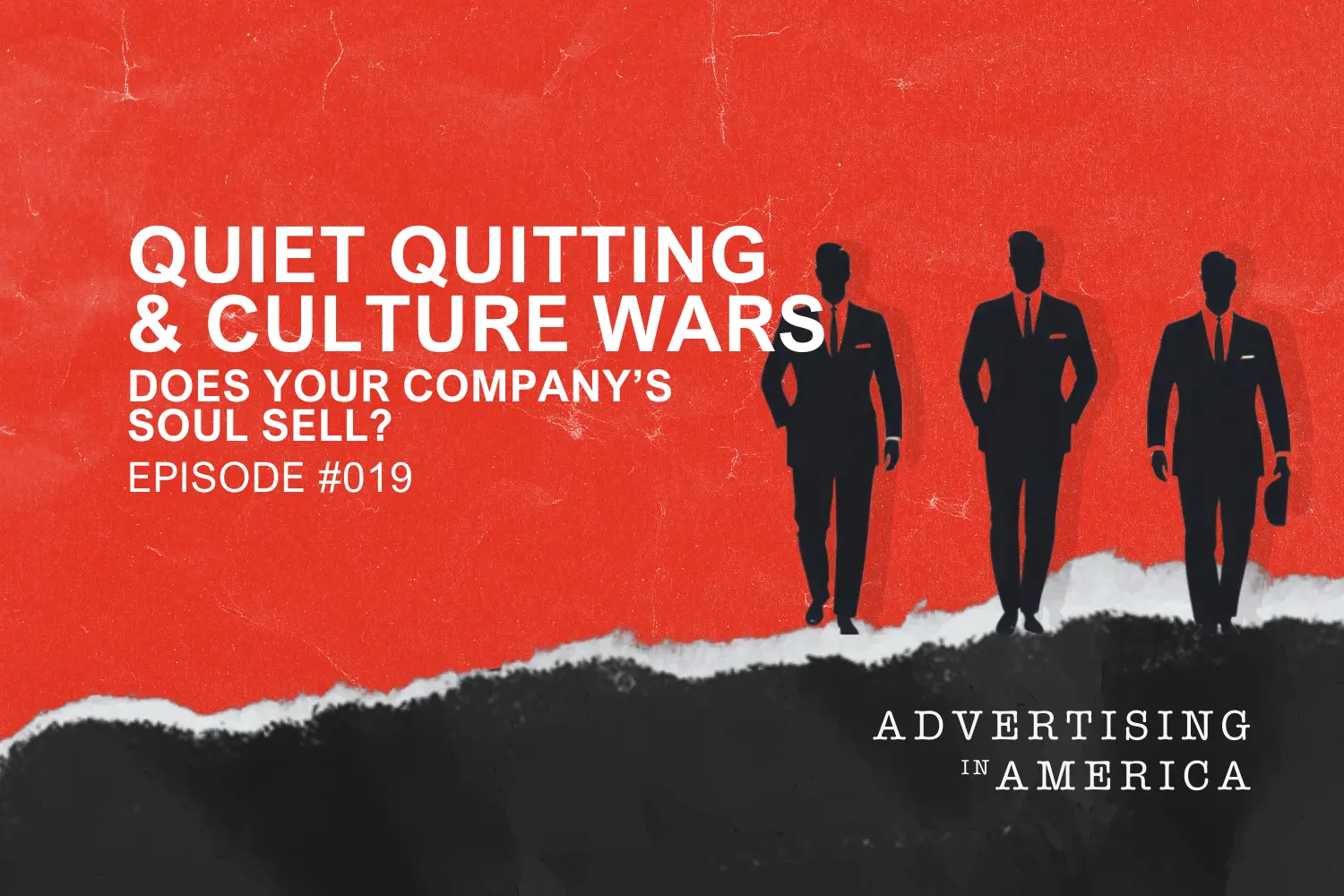
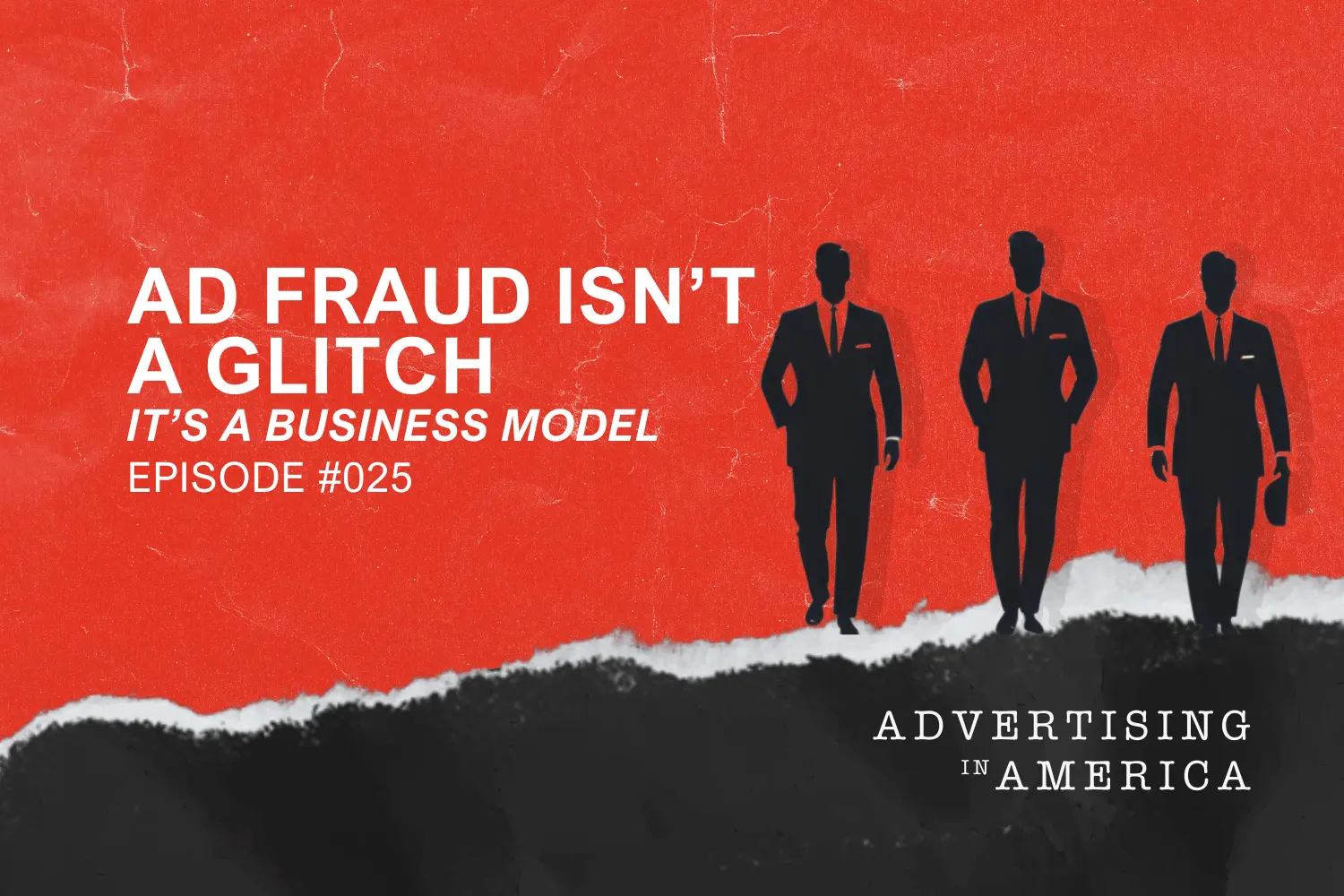
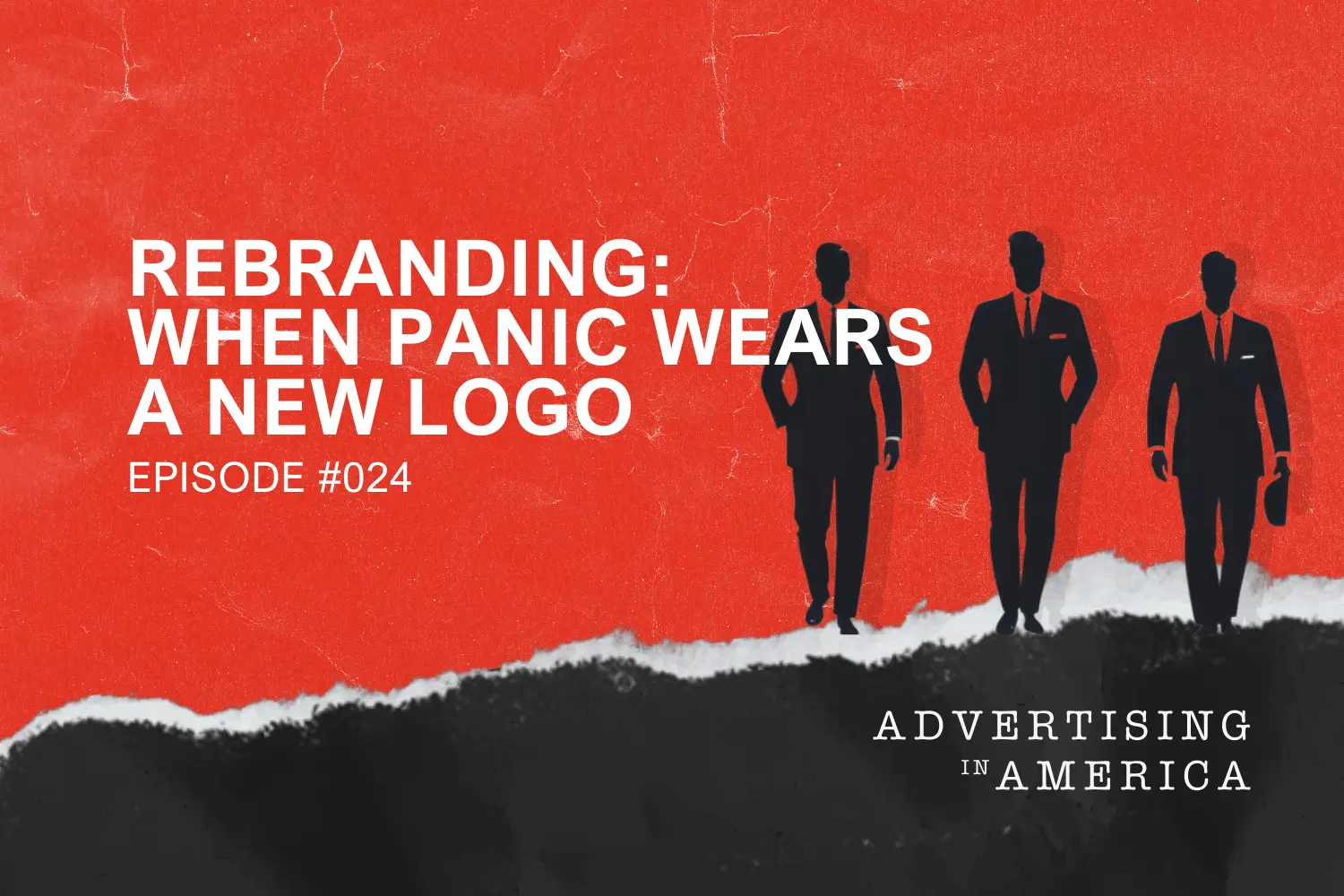
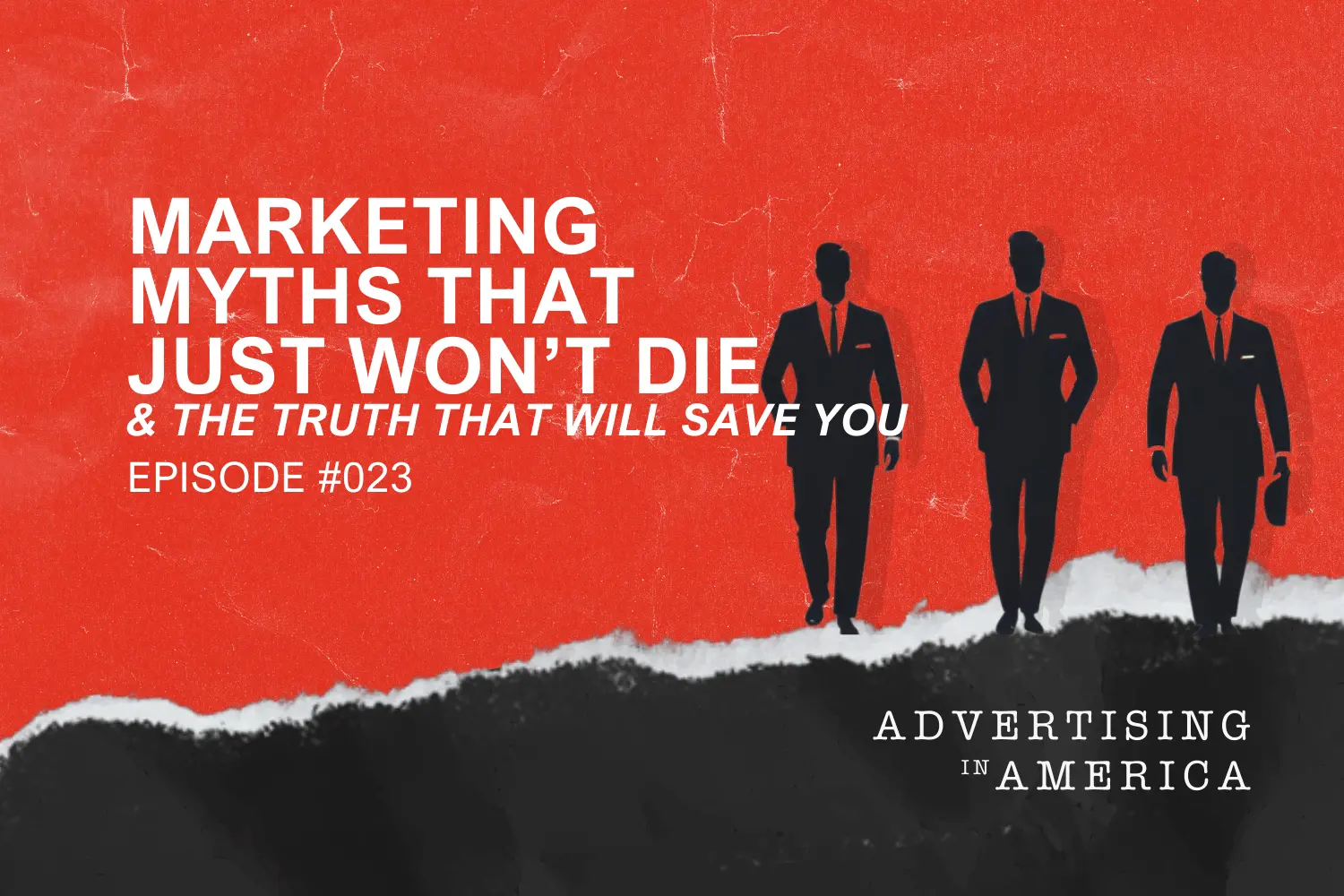

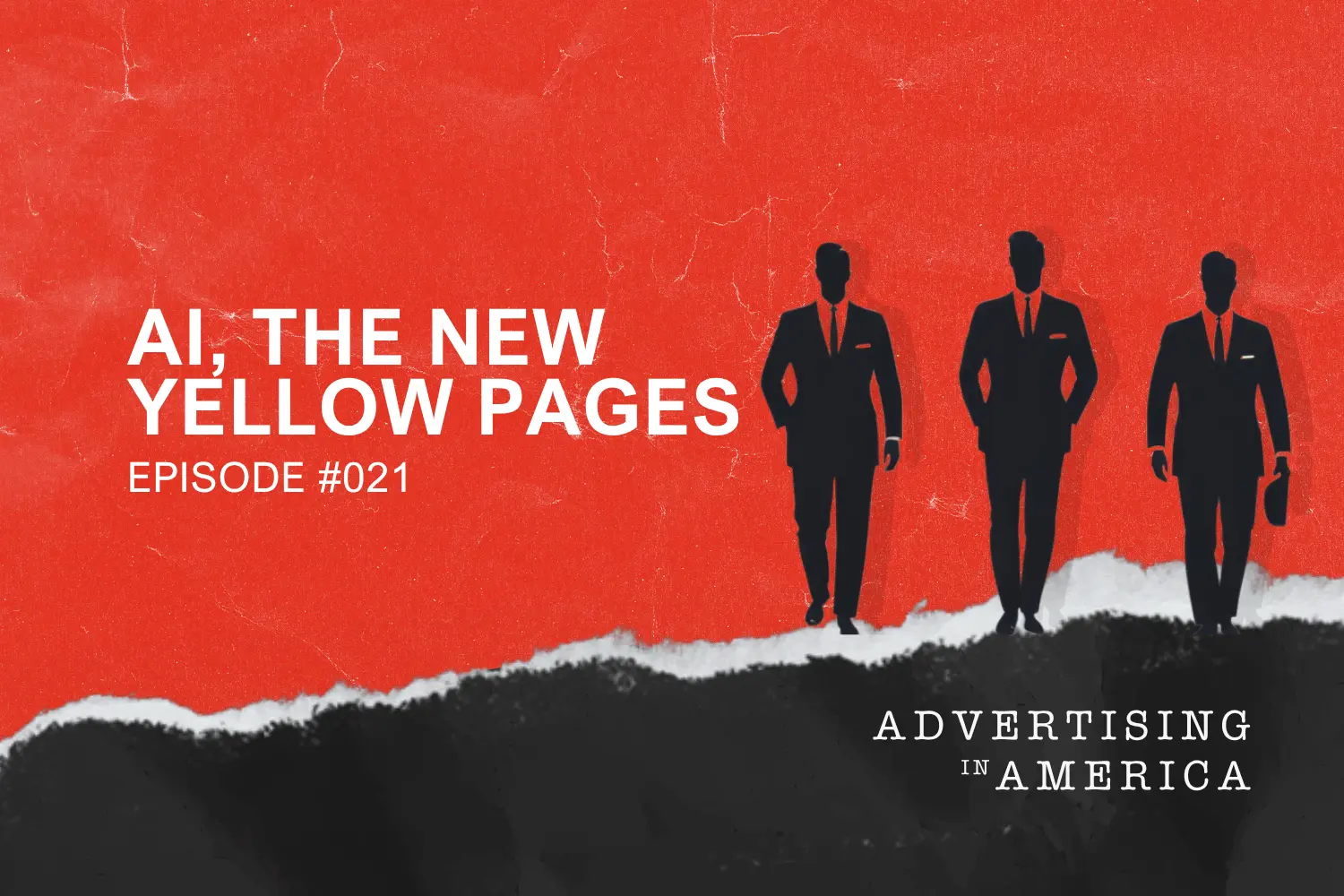

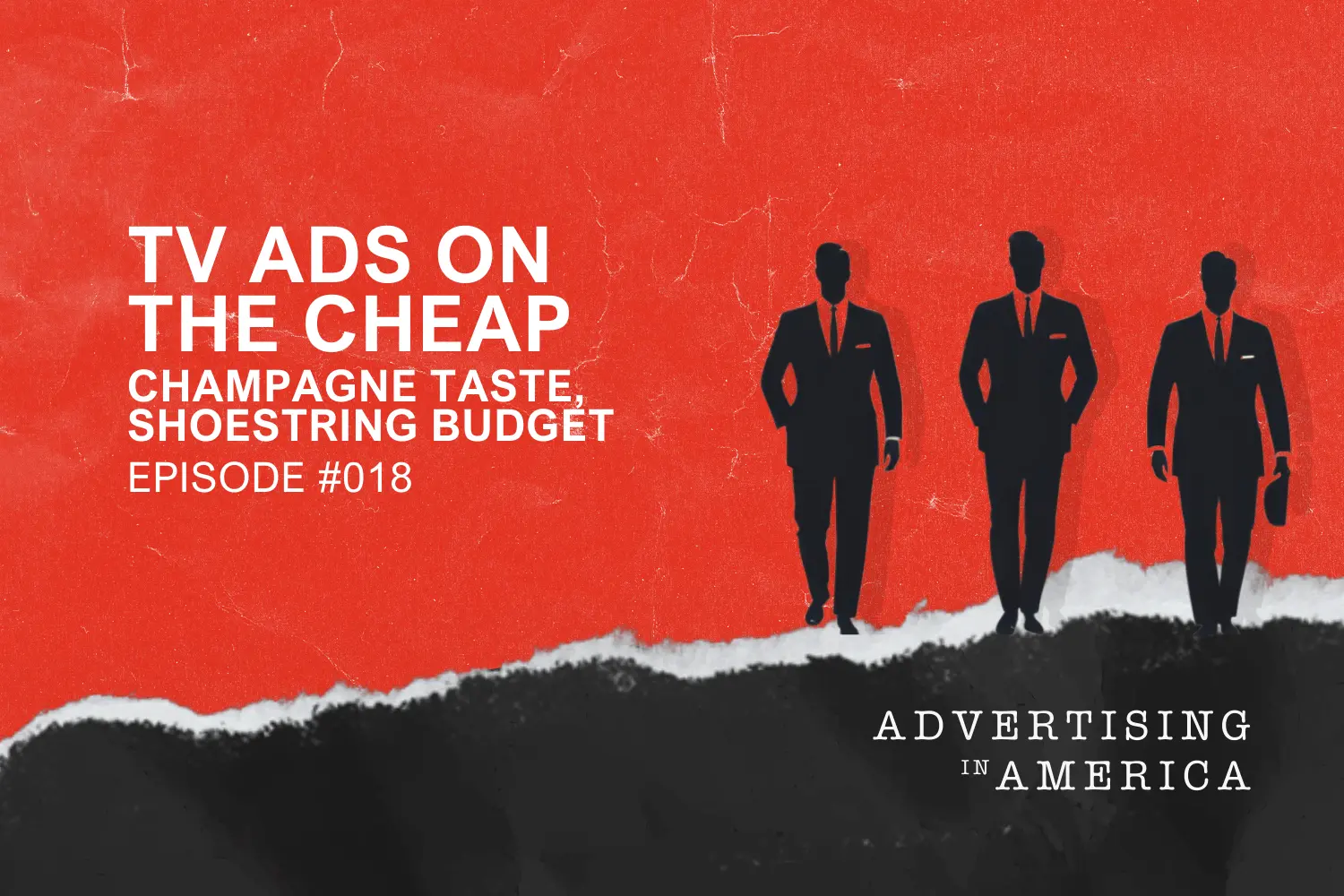
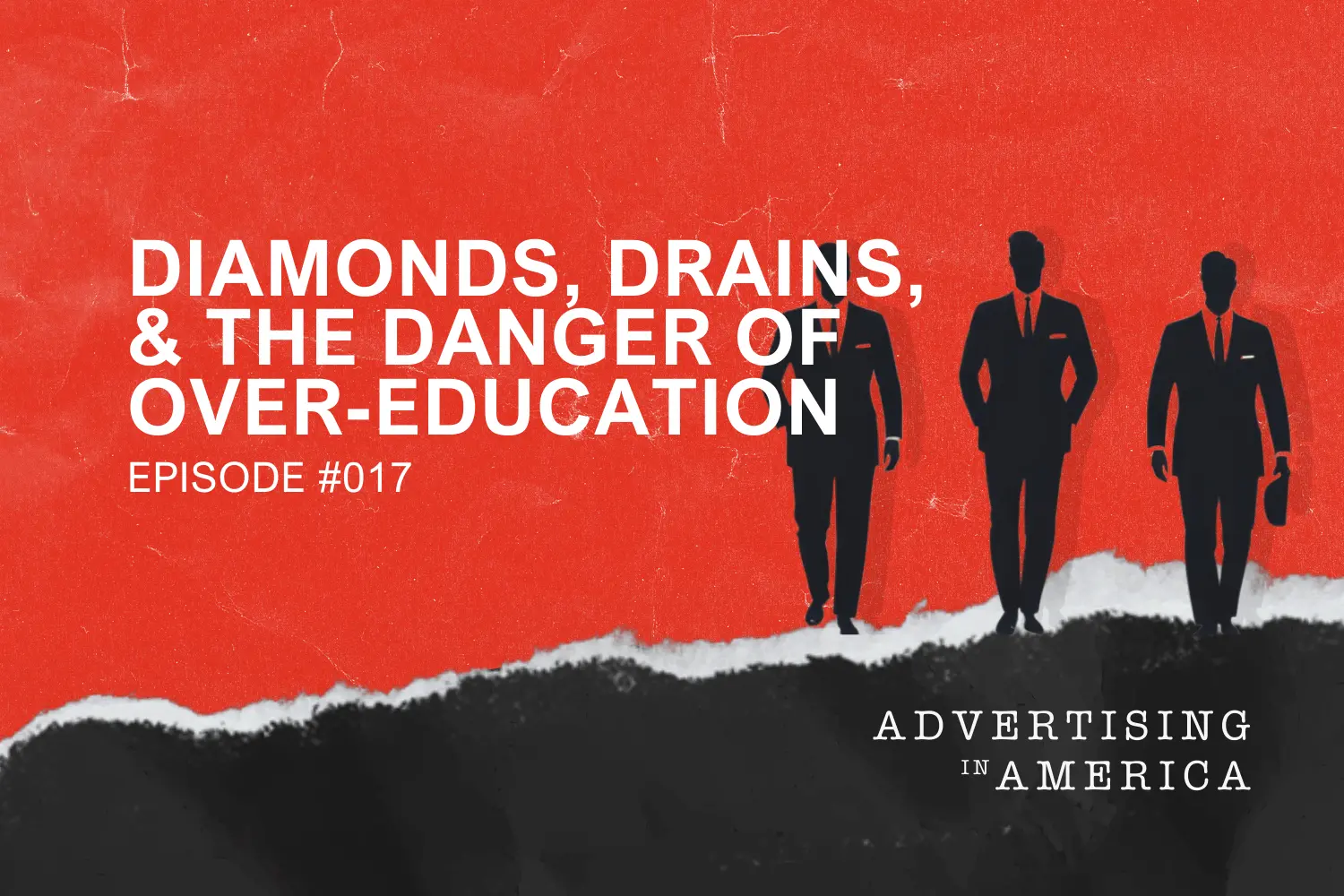
.webp)
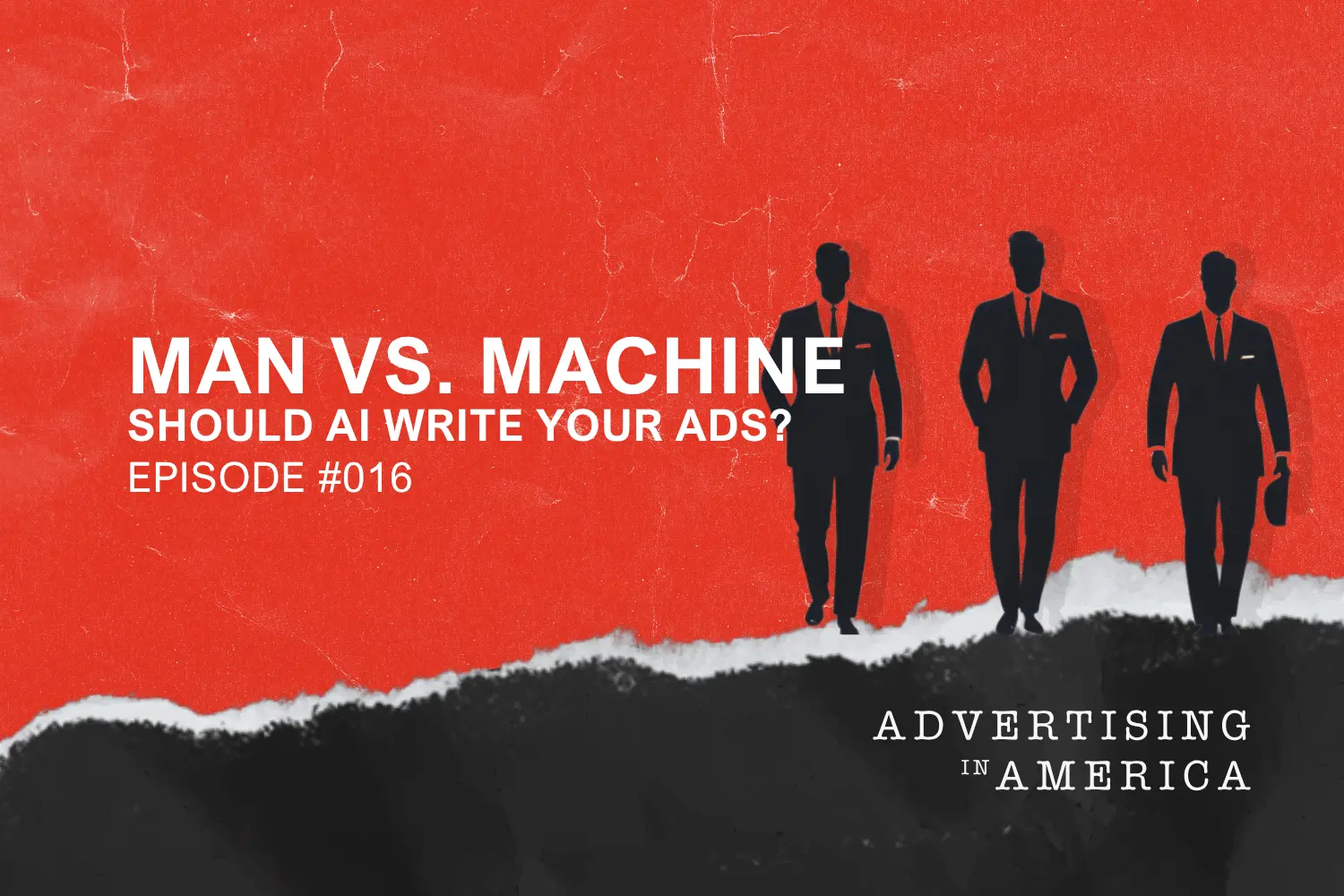










.webp)

.webp)
.webp)

%20(1).webp)
.webp)
.webp)




.webp)


.webp)






.webp)




.webp)
.webp)


.webp)
.webp)







